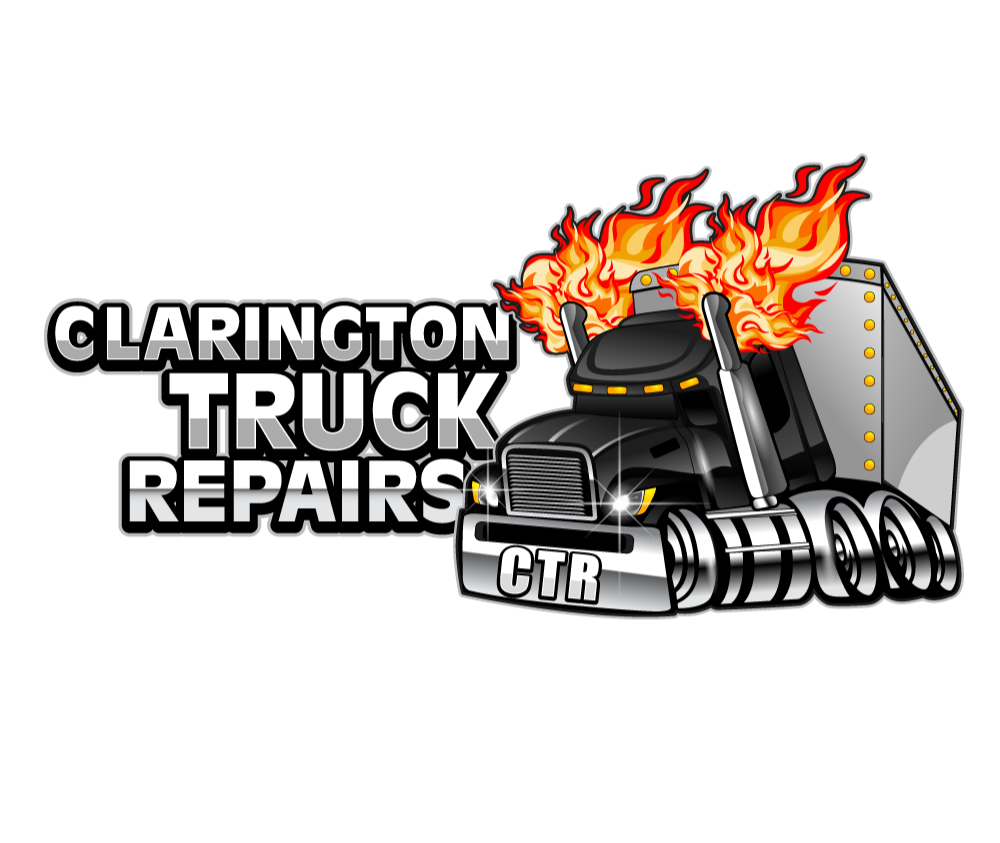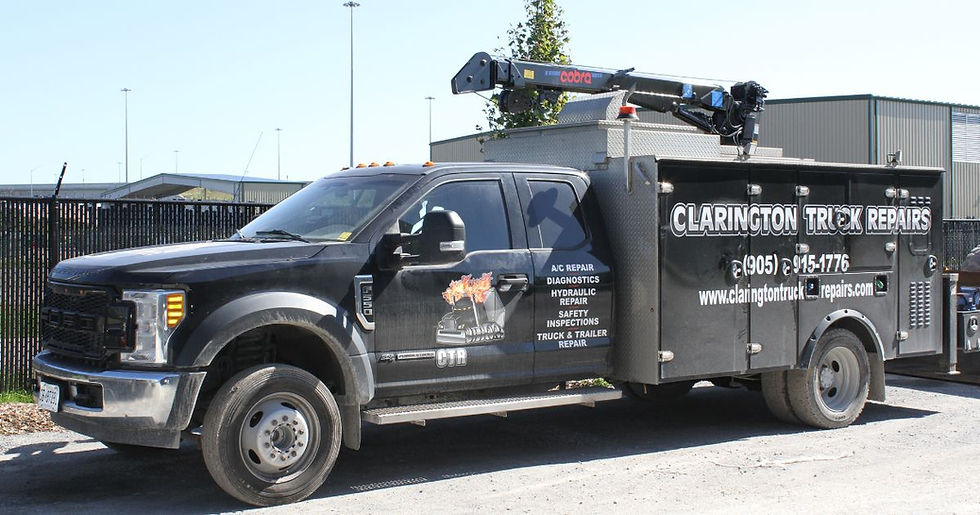Top 10 Signs Your Heavy Truck Needs Immediate Repair
- Clarington Truck Repairs

- 4 days ago
- 5 min read
When you rely on heavy trucks to run your business, any unexpected breakdowns can be detrimental. This is why staying ahead of mechanical issues is the best way to avoid downtime and prevent small problems from becoming major repairs.
At Clarington Truck Repairs, we help operators and fleet owners stay safe, productive, and compliant on the road. Knowing the warning signs of truck troubles is the first step. Here are the top 10 signs your heavy truck needs immediate repair, what they mean, and why acting quickly matters.

1. Unusual Engine Noises or Performance Changes
A healthy heavy-duty engine runs with a relatively smooth, consistent sound. If that sounds changes and you hear knocking, grinding, ticking, hissing, or loud vibrations, you’re hearing your truck’s early warning system.
Common causes of unusual noises include:
Worn bearings or pistons
Valve or timing problems
Exhaust manifold leaks
Fuel injector malfunction
Turbocharger issues
Strange noises typically mean components are struggling, misaligned, or wearing faster than normal. If ignored, this can lead to full engine failure or catastrophic internal damage. When you bring your truck to our Clarington truck repair specialists early, we can diagnose the noise before it becomes a multi-thousand-dollar problem.
2. Loss of Power, Poor Acceleration, or Reduced Towing Ability
If your truck suddenly struggles to accelerate or feels like it’s dragging, even when it's empty, don’t assume it’s just “age” catching up. A loss of power usually points to deeper mechanical issues.
Potential causes include:
Fuel contamination or clogged filters
Turbocharger failure
EGR or DEF system problems
Low compression
Faulty sensors affecting ECM performance
Fuel pump wear
Performance issues affect fuel efficiency, safety, and the ability to meet delivery schedules. The sooner you schedule your truck repair in Clarington, the sooner your truck can regain full power and reliability.
3. Excessive or Abnormal Exhaust Smoke
Smoke is one of the clearest signs something is wrong. Each colour tells a different story:
Black smoke
Indicates too much fuel is being burned, often caused by injector issues, clogged air filters, or a malfunctioning turbo.
White smoke
Usually signals coolant entering the combustion chamber. This is often linked to head gasket failure or injector timing issues.
Blue smoke
Means oil is being burned, commonly from worn piston rings, valve seals, or turbocharger problems.
No matter the colour, excessive smoke means your truck is burning fuel or fluids inefficiently and most likely suffering internal damage. Getting an early diagnostic can save your engine and prevent roadside breakdowns.

4. Dashboard Warning Lights or Fault Codes
Modern heavy trucks are equipped with sophisticated sensor systems. Your check engine light, DEF system warning, ABS alert, or other dash indicators are not optional suggestions. These are your truck’s built-in protection system.
Some common triggers:
Sensor failures
Low DEF levels
Emissions system restrictions
Fuel system pressure problems
DPF regeneration issues
Ignoring fault codes often leads to trucks going into limp mode or experiencing full system shut-downs. At Clarington Truck Repairs, we use advanced diagnostic equipment to read and interpret codes accurately, helping you avoid unnecessary downtime.
5. Difficulty Shifting Gears or Transmission Slipping
Your transmission is responsible for transferring power to your wheels, so any problem here can quickly turn into an expensive failure.
Watch out for:
Hard shifts
Delayed shifting
Grinding noises
Trouble engaging gears
Transmission overheating
Fluid that smells burnt or appears dark
Heavy trucks rely on consistent torque and smooth gear transitions. Transmission problems rarely fix themselves, so immediate repair can prevent full rebuilds or replacements.
6. Fluid Leaks of Any Kind
Fluid leaks are one of the most common issues we see in the shop, and one of the most dangerous to ignore.
Leaks may involve:
Engine oil
Coolant
Transmission fluid
Brake fluid
Power steering fluid
DEF or fuel leaks
A small leak often means a seal, hose, or fitting is failing. Over time, that leak can lead to overheating, brake failure, or engine seizure. If you notice stains on the ground or a sudden drop in fluid levels, schedule a repair immediately.

7. Vibrations, Shaking, or Unusual Handling
Vibrations don’t just affect comfort, they also affect your safety.
Potential causes of vibration include:
Tire imbalance or alignment problems
Damaged u-joints
Failing wheel bearings
Suspension wear
Driveshaft issues
Shaking through the steering wheel or cab often means something is loose or wearing unevenly. If left unresolved, it can lead to component failure at high speeds, putting your load and driver at risk. Our team can inspect your suspension, tires, and driveline to determine the exact cause.
8. Overheating or Rising Engine Temperatures
Overheating is a major red flag that your cooling system or engine is under significant stress.
Common causes:
Low coolant
Radiator blockages
Failing water pump
Faulty thermostat
Cracked hoses
Cooling fan issues
Driving an overheating truck can cause warped heads, blown gaskets, or even a cracked engine block. If your temperature gauge rises above normal, stop driving and schedule immediate truck repair in Clarington.
9. Steering Difficulty or Reduced Control
If your steering feels stiff, loose, or unstable, your truck may have issues with:
Power steering pump
Steering gear box
Tie rods, ball joints, or linkage components
Low fluid
Misalignment from potholes or rough job sites
Steering issues can make driving unpredictable and dangerous, especially when hauling heavy loads. Proper steering response is essential for safe braking, lane control, and emergency maneuvering.

10. Sudden Increases in Fuel Consumption
If your fuel economy drops unexpectedly, it’s often a sign that your engine or emissions system is struggling.
Underlying issues may include:
Malfunctioning injectors
Clogged filters
Worn engine components
Incorrect sensor readings
Low tire pressure or misalignment
Faulty turbocharger
Fuel is one of the largest expenses in the trucking industry. Fixing the issue early saves you money and improves long-term engine health.
Why Acting Quickly Protects Your Truck, Drivers, and Business
When you operate heavy trucks, your equipment is the lifeline of your operation. Acting quickly when issues appear offers major advantages, such as:
Lower repair costs: early repairs cost far less than major component replacements
Less downtime: keep your truck earning instead of sitting in a shop
Improved safety: protect drivers and other motorists
Extended truck lifespan: regular maintenance prevents premature wear
Better fuel efficiency: a healthy truck uses less fuel and performs consistently
Higher reliability: predictable performance keeps your business running smoothly
Waiting too long can turn a minor issue into a major operational setback.
Get Back on the Road with Confidence
Don’t wait until a minor warning becomes a major breakdown. Whether you operate one truck or an entire fleet, our team is here to support you with dependable Clarington truck repair services that keep your business moving.
Contact Clarington Truck Repairs today to book an inspection or service appointment!

_edited.png)
